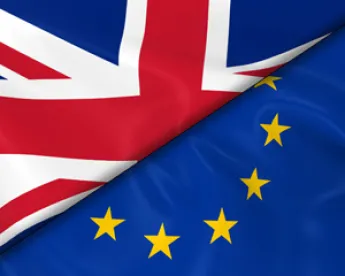We have previously reviewed developments leading to the Brexit vote, the negotiating process that is now unfolding, possible alternative/outcomes and the likely implications as the UK resets its relationship with the EU.
 This post focuses on Brexit risks and uncertainty related to standardization and innovation. As with the issues relating to competition policy/procedure, questions on standardization and innovation remain to be answered as the terms and timing of the UK Brexit are played out and as businesses, governments and individuals take their own actions – whether large or small, intentional or inadvertent.
This post focuses on Brexit risks and uncertainty related to standardization and innovation. As with the issues relating to competition policy/procedure, questions on standardization and innovation remain to be answered as the terms and timing of the UK Brexit are played out and as businesses, governments and individuals take their own actions – whether large or small, intentional or inadvertent.
Suffice to say, there will likely, over time, be divergences and penalties that will not only change the “rules of the game” but as well undercut important drivers for product development, innovation, consumer welfare and economic progress. Even in the best of cases (whatever that may be), inevitable divergent paths presages difficult times ahead for the UK, the EU and its trading partners – less transparency, less consensus, greater costs and increased uncertainty. However dead the US/EU TTIP free trade agreement may be in this political season, Brexit is one of the nails in the TTIP coffin.
It is useful to reiterate, as said before, that the EU was created to merge “essential” interests of previously rivaling nations and to build a foundation for an economic community of “destinies henceforth shared.” Critical to the achievement of such goals was considered the harmonization of trading terms and conditions and promotion of economic progress through innovation. Brexit undercuts such lofty goals and underscores continuing differences, prejudices and suspicions. While such terms may have an emotional element, they pose serious real practical costs.
For issues of standardization (“harmonization”) and innovation, the outcome of the Brexit process will have important implications. As explained in more detail below, harmonized standards across as wide a trading area as possible produces substantial economies of scale and efficiencies. In a similar fashion, innovation is best stimulated in an environment of expanding demand opportunities and through easily-accessed funding opportunities. Brexit threatens the UK and even the EU with risks on both counts. To the extent that divergence between standards applicable in the UK and the EU emerge, companies will face reduced market opportunities, reduced scale economies, increased costs and inefficiencies. In the same vein, innovation thrives in the freest and largest markets possible. As important, potential innovators need ready access to funding for their projects. Brexit threatens both a diminution of opportunities and resources available to fund such activities.
While it is premature to predict the outcome of the Brexit endgame, there a number of templates that have varying impacts on product standards and innovation. Among the choices facing the UK and its former EU counterparts are potential worlds in which the UK is 1) a member of the European Free Trade Association (“EFTA”) (e.g., Switzerland), 2) a member of the European Economic Area (“EEA”) (e.g., Norway, Iceland and Lichtenstein; 3) a member of a newly negotiated or already existing free trade customs union with the EU (e.g. Morocco, Tunisia, Israel and Turkey, etc.); 4) a member (albeit, a continuing one, of the World Trade Organization (“WTO”) and the European Patent Convention (“EPC”); or 5) a variant of some or all of the above. Obviously, the UK cannot dictate the outcome alone. Brexit is a negotiation likely to be affected by political, economic and cultural tensions.
The implications of these choices will have important outcomes on questions of product standardization and innovation. These outcomes will, of course, vary. First, on the one hand, whatever the Brexit outcome may be, the UK will still have a substantial body of EU-generated (uniformed, harmonized) laws and regulations on its books which will continue in full force and effect in the UK, unless repealed. There would not seem to be any substantial rush, logic or incentive to change them. At least in the short term, there would appear to be continued convergence, not immediate divergence.
On the other hand, if Brexit takes the form of an EFTA or EEA, there will be, going forward, no automatic direct effect of new EU legislation within the UK. Importantly, the UK will no longer have any direct say in such new laws and policies. Assuming no EFTA- or EEA-like EU relationship, the UK can always fall back on its WTO rights through WTO enforced agreements (to which the UK and the EU are signatories). The WTO Agreements on Technical Barriers to Trade and Sanitary and Phytosanitary Measures are two examples with obvious relevance to standardization. Nevertheless, any of these alternatives carry potentially risks, financial implications and process inefficiencies, when compared to the EU regulatory process (however cumbersome it may appear).
In addition, however desirable free/harmonized and tariff-free movement of goods and services may be, such benefits may be impacted if not linked with free movement of people and capital that seems likely to be lost through Brexit. As noted below, this will be particularly the case with innovation, which depends on available capital as well as bright inquiring minds.
A comprehensive analysis of potential risks for product standardization is beyond the scope of this post. However, fundamental to the standard setting process are agreements on mutual recognition of standards through conformity assessment procedures. Within the EU, these principles have been central to the creation of the European common market from the outset – “elimination as between member states of … quantitative restrictions on the import and export of goods and all measures having equivalent effect.” Outside the EU, there are many examples. Such mutual recognition/conformity assessment procedures lie at the heart, for example, of the WTO Technical Barriers to Trade Agreement, referenced above. These principles have served well the mutual interests of the United States and the European Union (among others). However, such a system, as noted above, would, relatively speaking, never be as cohesive as the EU’s system in which the UK participated since joining in 1973.
With Brexit, the UK will no longer be able to influence directly the standards setting process that results in EU legislation – e.g., regulations – that are binding and have direct effect in EU member states. Brexit poses risks in other sectors where EU regulation provided uniform, EU-wide market direction and procedures. Brexit will make standard setting more cumbersome, more costly and more likely to create differences and tensions.
That said, it should be recognized that standard setting as well is often undertaken on a sectoral basis. There are many examples of industries in which standards are set not on an EU or a national basis but on a multinational or even global basis. This is true, for example, in the motor vehicle sector in which efforts at harmonization of vehicle regulations have long been undertaken through organizations like the United Nations Economic Commission for Europe. Outside this sector, there are as well myriad European focused organizations like the European Committee for standardization (“CEN”) and the European Telecommunications Standards Institute (“ETSI”) that promote harmonized standards. Thus, for standards, Brexit may prove to have an uneven effect depending on the particular issue and the particular sector. For the UK and for companies doing business in the UK, Brexit will, on balance nevertheless, produce uncertainties, less transparency, less leverage, greater complexity, delay and increeased costs.
Brexit poses similar issues and concerns for innovation. Innovation depends on idea creation. Idea creation does not exist in a vacuum. It depends on a structure facilitating creativity that is dependent on funding (whether one likes it or not), free exchange of ideas and structures/vehicles for product development. The UK has long had a tradition of educational excellence and research. Brexit does not so much threaten extinction of such values as it threatens the UK with a diminution of available funds, reduced opportunities for collaboration and free exchange of ideas among creators of innovation and loss of a critical seat at the table where policies and priorities are determined. As a member of the EU, the UK participated fully as an EU member not only in the funding available from programs like Horizon 2020 (which has nearly €80 billion in funding available) and the EU framework programs (funding so-called “networks of excellence” in critical areas like breast cancer research). Brexit will substantial diminish UK involvement in the creation and guiding of the programs in the first instance.
There is debate about what the exact amount of the loss of funding with Brexit will be (in monetary and percentage terms). Some say that the EU has accounted for less than 5% of UK R&D. Opponents of Brexit counter that the EU provides funding for more than 15% of UK science grants (up over 70% since 2007). Whatever is the correct way to evaluate the impact of Brexit, no one can dispute that UK research and innovation institutions/centers/universities will be net losers as a result of Brexit. While non-EU members can participate in programs like Horizon 2020 (and any follow-on programs after 2020), such participation by the UK would be as an associate member. As an associate member, its participation would appear to be limited to only certain “pillars” (e.g., “Excellent Science” but not “Industrial Leadership” and “Societal Concern”). The UK would not receive any EU funding if as an associate member the UK’s GDP is above a certain level (almost surely the case for the UK) and if, as was the case with Switzerland recently, the associate member would be deemed to hinder free circulation of people.
Alternatives for the UK outside the EU to have the same level of participation in and influence in the development of European innovative ideas will clearly be diminished. Some argue that UK should turn its attention on innovation opportunities in countries like the United States, Australia and Canada. While clearly those destinations have and will continue have cutting-edge research and development opportunities, they enforce visa restrictions that the UK did not face with the EU before Brexit. Equally important is the potential loss, while hard to measure and quantify, of diminished intellectual exchange and dialogue that will come as a result not only from the restrictions on EU students and scientists studying/working/innovating in the UK but as well the barriers UK students and scientists will face when seeking to study/work/innovate in EU institutions/laboratories and universities.




 />i
/>i

